Collectors of sanctions exports. How St. Petersburg companies transported banned bitumen to Europe

Chronicles.Media has found out that sub-sanctioned oil products were delivered to the European Union bypassing Georgia. This was done by entrepreneurs from St. Petersburg, whose European companies were part of the partner network of Gazprom’s subsidiary.
Pavel Ishkov, a businessman from St. Petersburg, published a series of photos on VKontakte in 2012. They showed several men, including Ishkov himself, dressed in naval uniforms with badges from St. Petersburg’s Admiral Makarov State Maritime Academy (now the State University of Sea and River Fleet). They were partying alongside street musicians in the center of Riga on Kalqiu Street in the Old Town.

In 2016, Ishkov became one of the co-owners of the logistics company Keystone Logistics Ltd. It is one of the Russian legal entities that in 2023 imported banned bitumen (a material used, in particular, when building roads) into Latvia through the intermediary in Georgia.
In February 2023, the European Union agreed on the tenth package of sanctions against Russian goods and, among other things, banned the import of bitumen and asphalt. The imposed restrictions did not apply to contracts that were concluded before February 26. These deliveries could have been fulfilled until May 27, 2023.
The companies in question are interrelated through their owners — they are St. Petersburg-based Keystone Logistics LLC, Cargotechesservice LLC (KTS) and North-West Bitumen Terminal LLC (NWBT).
St. Petersburg collector
These companies are owned by a group of entrepreneurs, including Vadim Fridman, a businessman well-known in St. Petersburg social circles. Here he is with his wife Anastasia Fridman (Sorokina) at the gala of the St. Petersburg International Economic Forum in 2016, and here they are posing for a photo at a charity reception at the Hermitage in 2022.

On the website of Nova Art, an all-Russian competition of projects by young artists whose trustees are, among others, Fridman and Sorokina, the couple are referred to as «collectors.»
In 2019 The couple was going to settle on Martynov Embankment on Krestovsky Island, the most elite neighborhood in St. Petersburg. The spouses wanted to buy an apartment with a terrace worth 131.5 million rubles. However, they later abandoned this idea and through the court demanded that the real estate company return the advance payment of 2 million rubles (20 000 euros)
Fridman’s main business, which allows him to seek expensive housing in St. Petersburg, is not related to art. The entrepreneur’s money comes from software development, sand and clay mining, and transportation. His companies and imported bitumen into the EU.
As «Chronicles.Media» calculated using the customs database Sinoimex (compiled by the Chinese company Dalian Infobank), a total of at least 29.5 thousand tons of bitumen worth $7.8 million were sent from Russia to Latvia in 2023. Of this, $3.4 million (about 287.7 million rubles at the average 2023 dollar exchange rate) is accounted for by Fridman and his partners’ companies.
Route through the «Tbilisi Free Zone»
In 2023, Fridman and partners sold bitumen to Latvia not directly, but through the intermediary company Syntex, as «Chronicles.Media» has found out. The customs declaration, obtained by the media , states the recipient’s address on the Georgian side – and it is located in the so-called Tbilisi Free Zone. It was created to attract foreign investments. Companies located here enjoy tax benefits: for example, goods imported by these companies are free from customs import tax.
Syntex company is indeed registered at the Tbilisi address. According to the Georgian business register, it belongs to a 59-year-old local businessman Zurab Munjishvili, as «Chronicles» has verified. In 2024, the company changed its name to “Agrobiotech”.
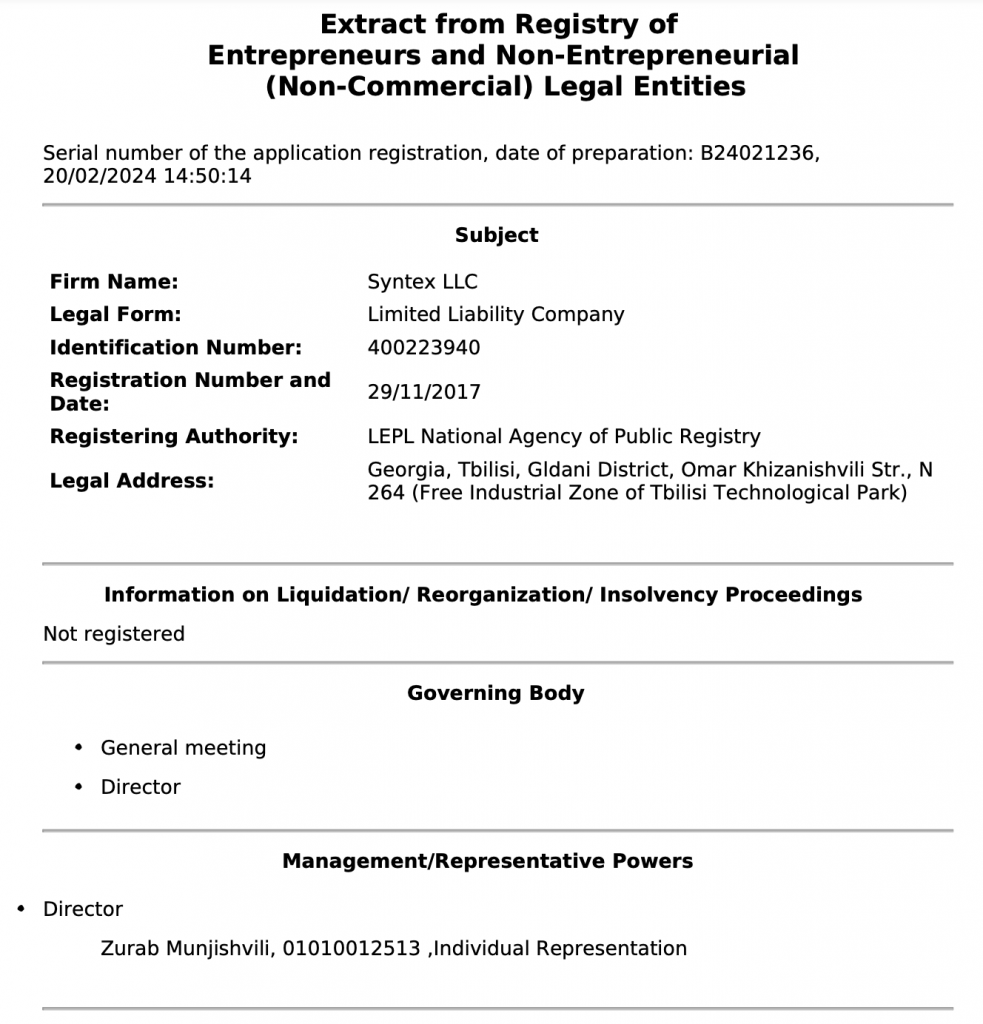
The legal entity was originally owned by Himtee Devi Harpal, a citizen of Mauritius, but the email address listed in the documents is linked to the Syntex International Group.
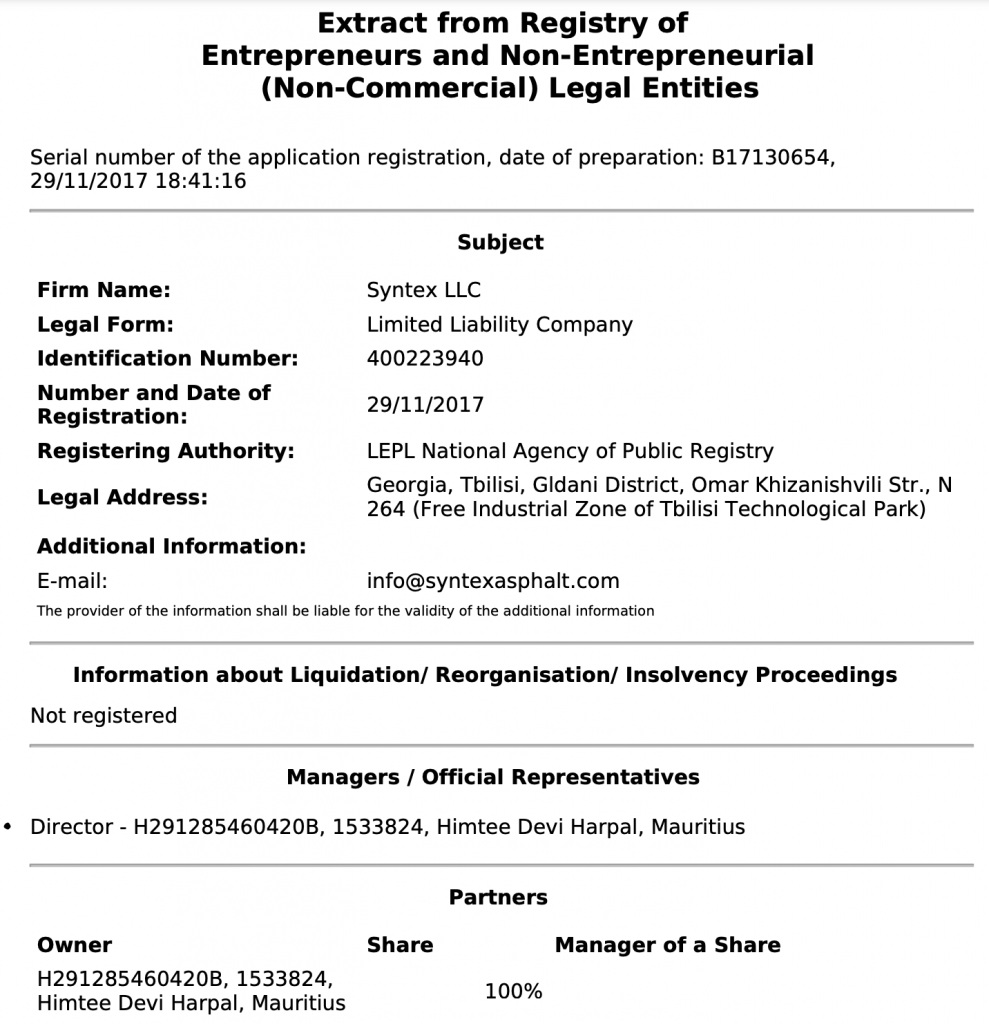
The registration address of the Georgian Sintex (Agrobiotech) in the Tbilisi Free Zone is needed only to receive tax benefits. Company’s website shows completely different address — Giorgi Leonidze Street, 2. It is in the very center of Tbilisi, next door to the city parliament sharing the same building with the Norwegian Embassy.
Judging by the transactions of one of Fridman’s companies, NWBT , obtained by the “Chronicles”, it started paying for supplies to Syntex closer to the end of 2023. For example, on November 22, the company’s account transferred an advance payment of 149.9 million rubles for the supply of goods under the contract concluded on November 2. In total, NWBT transferred Rb 175.5m to Syntex in 2023. In 2024, the number of such transactions increased significantly: NWBT transferred 1.1 billion rubles to Syntex and then to Agrobiotech. These transactions may indicate that by the end of 2023, when European companies could no longer buy Russian oil products, NWBT found a way to circumvent sanctions by exporting goods through an intermediary in Georgia.
In total, Fridman’s companies transferred 2.3 billion rubles to Syntex/Agrobiotech for supplies in 2023-2024. And Georgia is probably just a transshipment point for goods banned in the EU.
Apparently, Georgian Syntex is a branch of the foreign companies linked to Fridman’s partners, as Chronicles.Media found. The company in question is a Latin American company of the same name, founded in Bolivia and with branches in Latin America and Germany. It specializes in the production of bitumen, and also imported this product into Latvia in 2023.
German Syntex is based in Hamburg. The choice of this city for business is most likely due to the fact that the local port is one of the largest in Europe. Rashid Urusov, a 34-year-old native of St. Petersburg, is among the company’s executives whose contact is listed on the website, «Chronicles» found out.
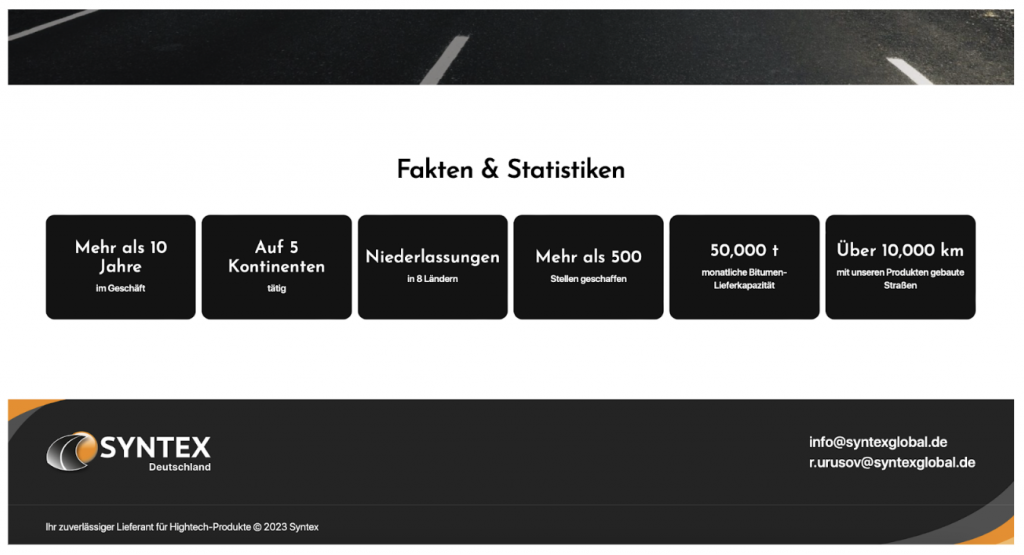
Urusov is a partner of Fridman and co-owner of several St. Petersburg companies, including NWBT, which supplied bitumen to Latvia.
In 2023, German Syntex brought bitumen not only to Latvia: oil products from St. Petersburg were also exported to the American city of Baltimore. The company sent there pallets of polymer-modified bitumen weighing a thousand tons.
Gazprom’s partners
Rashid Urusov also represents Keystone Group, shows the GetContact service, that allows to see how users call each other in their phone notebooks. Urusov was recorded as «Rashid Keystone Group Urusov» and «Rashid Keystone».

In 2023, Keystone Group, according to Sinoimex, transported bitumen blends primarily from Kazakhstan to Mexico and sulfur containers from Latvia to Brazil.
This is most likely an Estonian company, which is part of the distribution network of Gazprom’s subsidiary Gazpromneft — Bituminous Materials. This cooperation is mentioned on the company’s website. Urusov is named there as a representative of Estonian Keystone Shipping, and the contacts list the Keystone Group website. On January 10, 2025, the United States added Gazpromneft — Bituminous Materials to the sanctions lists.
Keystone Shipping’s revenue in 2023 amounted to EUR 226.4 million. According to the Estonian Business Register the beneficiaries of Keystone Shipping and Keystone Group are Andrei Kolesnikov and Denis Piskunov. Piskunov also indicated on his LinkedIn page that he is the owner and lawyer of Keystone Group. As a lawyer, he deals, among other things, with cross-border fraud.things.
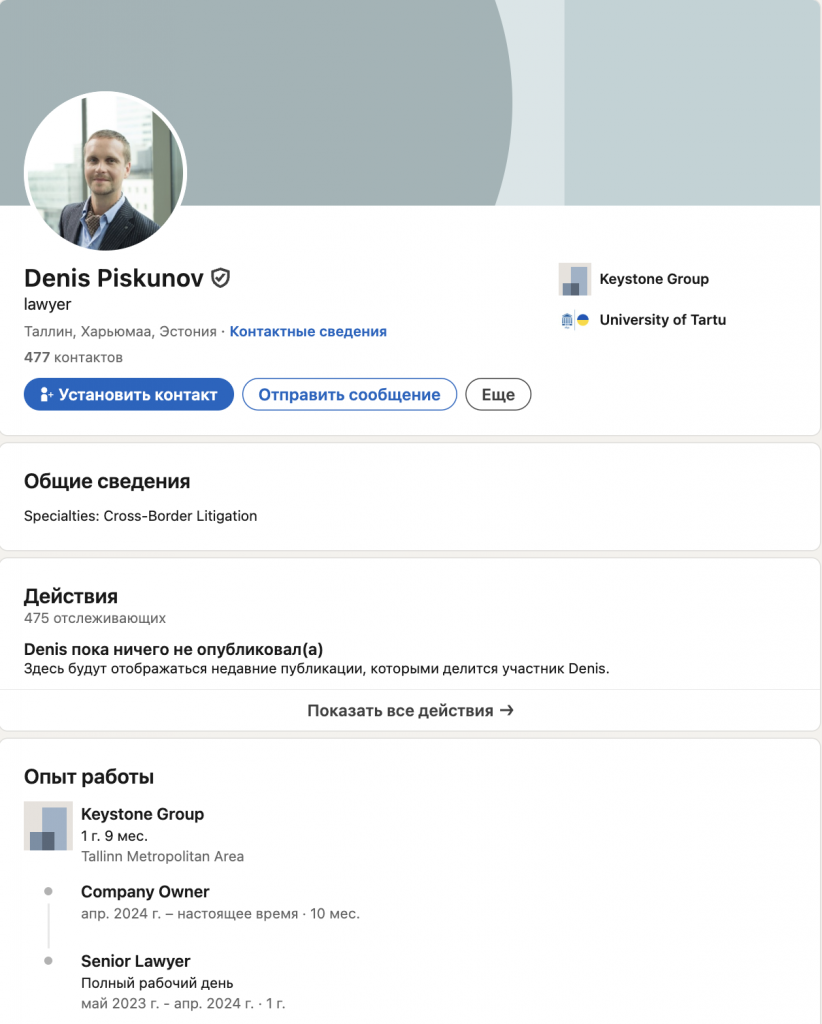
And Andrei Kolesnikov is a longtime acquaintance of Friedman’s St. Petersburg business partner Pavel Ishkov. Kolesnikov is also depicted on the same photo with men in the uniform of the Navy, made in the center of Riga. On his page in «VKontakte» the entrepreneur indicated that he attended a school in Tallinn, and graduated from the Makarov Academy in 2003. The future business partners could have met there.
The names of these companies echo the company of Fridman and Ishkov, which supplied bitumen to Latvia — Keystone Logistics. Interestingly, the shares of all co-owners in this business are pledged to JSC Expobank, which has been under US sanctions since the end of 2023.
It is also known that Keystone Logistics helped a Belarusian fertilizer exporter to circumvent sanctions: the company signed a contract with Belaruskali, which fell under EU and US sanctions, to transship 2 million tons of potash through the terminals of the Big Port of St. Petersburg.
In 2023, Keystone Logistics had revenue of 15.1 billion rubles and net profit of 139 million rubles.
The total revenue of exporting companies co-owned by Fridman amounted to 16.7 billion rubles in 2023.
Who else imported Russian bitumen into Latvia?
Bitumen from Russia was also supplied to Latvia without any intermediaries like Syntex. The list of importers includes prominent Latvian companies.
For example, in 2023, Igate brought from Russia 2.3 thousand tons of bitumen worth almost 746 thousand dollars, as Delfi.lv has found out. Igate is a well-known company in Latvia. It specializes in road construction. In 2023 and 2024, according to the Latvian Procurement Supervision Bureau, it won several dozen municipal tenders, and also built a fence on the border with Russia. In 2023, Igate’s turnover amounted to EUR 35.5 million, according to Latvian company Lursoft.
Jurgis Pučka, executive director and board member of Igate, told Delfi.lv that until recently almost all bitumen for Latvian roads came from Russia. It was of high quality and much cheaper than competitors could offer,
Marks Jaunzems, a representative of Byakko Cargo, claims that no one imports bitumen from Russia after the adoption of the tenth package of EU sanctions and its entry into force.
According to Jurgis Pučka, Igate no longer works with Russian merchants and carefully checks subcontractors and partners. It is alleged that the company buys all raw materials to produce bitumen from Lithuanian company Orlen. In a written comment, Igate representatives told Delfi.lv that under the contracts concluded in 2023, the company did indeed buy Russian bitumen, but that its «supply and import was ensured by other legal entities registered in the European Union.» At the same time, according to Igate, the goods entered Latvia before the sanctions date. The company refused to provide additional information, citing commercial confidentiality.
However, all three Igate bitumen shipments recorded in the Russian customs database are dated June 2023 (one shipment on June 26 and two others on June 27).
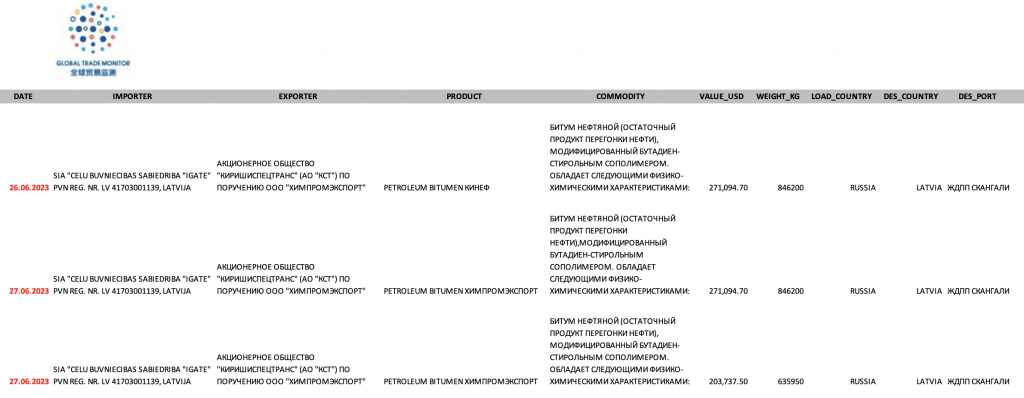
Jurgis Pučka explained it by some problems with the railroad train and promised to send documents proving it. Delfi.lv also requested a comment from Latvian customs. «Chronicles.Media» sent an inquiry to the local Financial Intelligence Service.
If Latvian businessmen can prove that they did not know about the origin of bitumen, they are clean before the law, the co-founder of the international NGO State Capture, lawyer Alex Presanti, explained to «Chronicles».
The main issue in this case, as ever, is whether the Latvian company knew that the bitumen it was buying from Georgia was of Russian origin. If the answer is «yes it did» — then — provided the contract was after 25 Feb 23 and the shipment was not subject to a derogation or license — it violated EU law. If it did not (or you cannot prove that it did) then there is probably no violation. If the company failed to conduct basic due diligence then it might be subject to a penalty.
If you have proof of direct imports after the relevant date, this is more likely to be a violation. The only exception is if the Latvian company got a license or fell under a derogation.
***
By the end of May 2023, the volume of petroleum and bitumen oils and similar products imported to Latvia from Russia has indeed fallen sharply — almost to zero. This is evidenced by the data of the Central Statistical Office of Latvia. But in the second half of 2023 it began to grow again and at the end of six months reached the amount of 17 million euros.
Imports have almost stopped already in 2024: at the end of the year, Russia will not even be among the top ten in terms of volume in this commodity category. Before the sanctions, the annual volume of imports of these goods into the EU, according to the European Commission, amounted to about 1.3 billion euros.
Sergey Kagermazov, Svetlana Martova, editorial staff of «Chronicles.Media» with the participation of Ingrida Drazdovska and Anatoly Golubov, Delfi.lv
The material was created with the support of Journalismfund Europe
